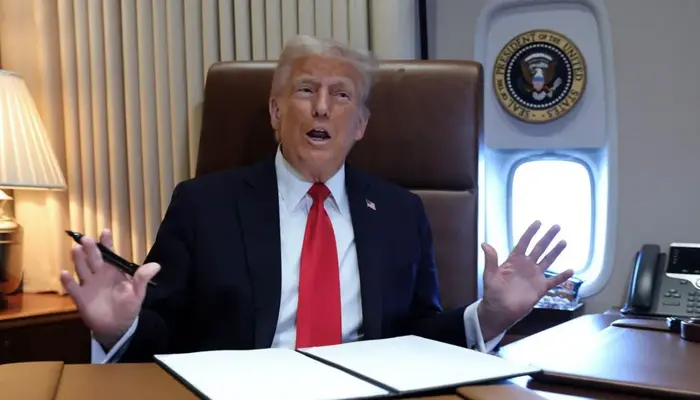
U.S. President Donald Trump has announced a 25% tariff on steel and aluminium imports, a decision expected to impact global trade. The move, part of his tariff policy, aims to protect American industries but could spark tensions with key trading partners, including Canada and the European Union.
New Tariffs on Steel and Aluminium
Speaking aboard Air Force One, Trump declared that all steel entering the U.S. would face a 25% tariff. He also hinted at reciprocal tariffs on countries that impose import taxes on U.S. goods. While he did not specify which nations would be affected, his stance signals another aggressive shift in trade policy.
Canada and Mexico, two of the largest steel and aluminium suppliers to the U.S., are likely to be hit hardest. Ontario Premier Doug Ford criticized Trump’s decision, calling it an economic threat. Canadian political adviser Catherine Loubier also warned that these tariffs could jeopardize thousands of U.S. jobs connected to Canadian steel and aluminium.
History of Trump’s Trade Tariffs
During his first term, Trump imposed similar tariffs in 2018, targeting steel and aluminium imports from Canada, Mexico, and the EU. A year later, the U.S. reached a deal to lift these tariffs for Canada and Mexico, but EU tariffs remained until 2021.
Past tariffs increased costs for U.S. car manufacturers and beverage companies, which rely on aluminium for cans. These costs were eventually passed on to consumers, according to the Tax Foundation.
Global Reactions and Economic Impact
The European Union stated that it had not received formal notice of the tariffs but saw “no justification” for them. EU officials warned that they would take action to protect European businesses and workers.
Australia’s Prime Minister, Anthony Albanese, announced he would seek an exemption, similar to the one granted during Trump’s first term.
Meanwhile, Trump’s comments sent South Korean steel and car stocks tumbling, reflecting the uncertainty among international suppliers. South Korea is a major steel exporter to the U.S., and any disruption could impact global supply chains.
Read: Saudi Arabia Condemns Netanyahu’s Remarks on Palestinian Displacement
China Responds with Trade Retaliation
China has already retaliated against U.S. trade policies by imposing restrictions on coal, oil, gas, and high-tech exports. In response to past U.S. tariffs, Beijing has also tightened controls on 25 rare metals essential for electronics and military equipment.
Chinese officials have condemned the tariffs, warning that a trade war benefits no one. Chinese economist Victor Gao called the latest restrictions “tit-for-tat retaliation”, emphasizing that Beijing seeks fair trade but will not hesitate to counter U.S. actions.
A Future of Trade Battles?
Trump remains committed to aggressive trade measures, insisting they will strengthen the U.S. economy. He has also promised more tariffs on the EU “soon” and hinted at targeted levies against nations taxing U.S. imports.
As global markets react, businesses and governments worldwide are bracing for a new wave of trade disputes that could reshape international commerce.
Follow us on Google News, Instagram, YouTube, Facebook,Whats App, and TikTok for latest updates












